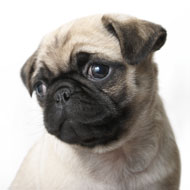
Decision made after request by Pug Breed Council
The Kennel Club has agreed not to accept registrations for merle pugs with immediate effect, following a request by the Pug Breed Council.
Merle colouring - patches of lighter colour in the coat - is the result of the M gene in dogs and does not occur naturally in pugs. The gene has two alleles - M (merle) and m (non-merle), with M being dominant.
The merle allele is also known to be associated with an increased risk of impaired hearing and sight, particularly in dogs that carry two copies of the M allele.
Owing to this and following a request from the breed council, the Kennel Club says it will not register merle pugs, including those imported from overseas.
Kennel Club secretary Caroline Kisko commented: "There are a number of breeds where merle is a naturally occurring colour, such as the Cardigan corgi and Shetland sheepdog. In these breeds there is a great tradition of the successful breeding of merle animals using well-established and careful methods.
"However, in breeds such as the pug there are no such traditions and so the Kennel Club has agreed that it will not accept the registration of any merle dogs, as it has done already with breeds such as the bulldog and French bulldog."



 The Veterinary Medicines Directorate (VMD) is inviting applications from veterinary students to attend a one-week extramural studies (EMS) placement in July 2026.
The Veterinary Medicines Directorate (VMD) is inviting applications from veterinary students to attend a one-week extramural studies (EMS) placement in July 2026.